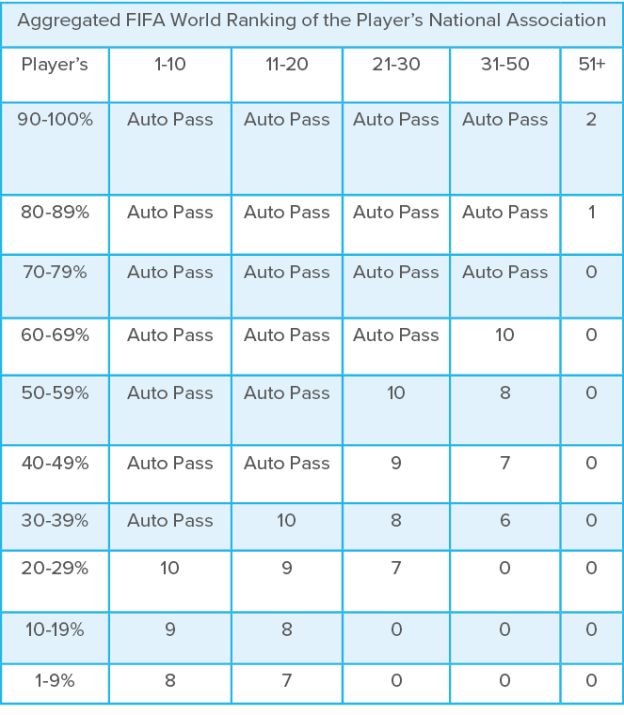In this article, Jack Freeland, Senior Solicitor in our immigration team, discusses The Home Office's recently approved new Governing Body Endorsement criteria for international footballers to play in the English leagues, effective from the opening of the summer transfer window on 14 June 2023.
What is a Governing Body Endorsement and why are the rules changing?
Japanese star Kaoru Mitoma was one of the Premier League's breakout stars this season. When he signed for Brighton in August 2021 however, despite having 25 goal contributions in a record-breaking season for Kawasaki in the Japanese J League, he was immediately loaned to Union Saint-Gilloise in the Belgian top-flight. He didn't return to Brighton until the 2022/23 season. Although it was beneficial for Mitoma to use the Belgian league to adapt to the pace of European football, that wasn't the reason he went there. He didn't stay at Brighton because he wasn't even eligible to play in the Premier League. He didn't qualify for a Governing Body Endorsement.
Following Brexit, all foreign players need an International Sportsperson visa to play professionally in the UK. To obtain the visa players must be 'sponsored' by their respective clubs, and clubs can only sponsor players who have been endorsed by their respective governing body, the Football Association (FA) for players in England. The FA makes an assessment to issue an endorsement based on set criteria.
Since the introduction of the post-Brexit endorsement criteria on 1 January 2021 there has been conflict between the FA and English clubs over the endorsement process. The Premier League in particular wanted to see rules relaxed to allow clubs better access to international markets, with all 20 clubs coming together last year to ask for a review of the current system. A consultation was set up to look into the endorsement regulations, and the result is the most significant change to the rules since 2021.
FA Governing Body Endorsement criteria
The FA endorsement criteria are points-based. Players need to score at least 15 points in the following categories to secure an endorsement:
- International appearances and FIFA ranking;
- Domestic club appearances;
- Continental club appearances;
- Final league position of the player's last club;
- Continental progression of the player's last club;
- League quality of the player's last club.
Players can however receive an 'Auto Pass' under the first category without needing to score any further points in other categories. The first category is based on the player's percentage of available minutes played at international level over the last 2 years, and players will score more points for appearances if their national team is higher in the FIFA rankings. The table below illustrates how this works:

A player representing the current World Cup holders Argentina would receive an Auto Pass for playing only 30% of available minutes for their country over the last 2 years. In contrast, a Ghanaian player would only receive 2 points under the first criterion for playing 100% of available minutes for their national team as Ghana are ranked outside the top 50 in the FIFA rankings.
An Auto Pass can only be achieved under the first category for international appearances. The other categories operate similarly, allocating points based on the number of appearances made and the standard of competition the player faces. The other categories won't be covered in detail here, but the full endorsement criteria are published on the FA website.
If a player is unable to achieve an Auto Pass or the required 15 points from other categories, the club can appeal to an FA Exceptions Panel if:
- A player achieves between 10 and 14 points, and the club can evidence 'exceptional circumstances' prevented the player from achieving 15 points; or
- If the player is a youth player, the club can evidence that the youth player shows 'significant potential and is of sufficient quality' to enhance the development of the game in England.
Kaoru Mitoma didn't qualify for an endorsement because he had no senior caps for Japan, and the level of competition in the Japanese J League meant that his prolific season at Kawasaki the previous year scored him less than 10 endorsement points. This meant Brighton couldn't even bring their case to the Exceptions Panel, and Mitoma was forced to accumulate more points in the Belgian First Division before coming back to Brighton.
Mitoma isn't the only example of this. A Sky Sports investigation revealed, over the past 10 seasons, one in seven Premier League transfers would have been ineligible under the current endorsement criteria. This includes big-name players such as Gabriel Martinelli, Alexis Mac Allister and Riyad Mahrez.
The Premier League clubs argued that this prevents them from signing young talent early, as they are forced to wait until players progressed in their careers to achieve enough points for an endorsement. Recognising that English clubs might get left behind by their European rivals, the FA have introduced a new rule to allow clubs to sign players who don't meet the FA criteria.
The new rules
From the 2023/2024 season English clubs will be able to sign players who fail to meet the endorsement points requirement. Under the new criteria these players are termed Elite Significant Contribution (ESC) players. Premier League and Championship clubs will be able to sign a maximum of 4 ESC players, while League One and League Two clubs will be able to sign a maximum of 2 ESC players.
The FA has however set some minimum requirements that ESC players are still expected to meet. They must meet at least one of the following criteria:
- Played in at least onecompetitive youth or senior international for a nation ranked in the FIFA Top 50;
- Played in at least five competitive youth or senior international for a nation ranked outside of the FIFA Top 50;
- Played in at least one Continental Youth or Senior Competition matches;
- Played in at least five Domestic Youth or Senior Competition matches.
Significantly, the domestic competitions referred to only apply to Band 1-5 leagues. This excludes players in Band 6 countries such as Canada, Finland or Peru from qualifying as an ESC player.
Going forwards, the number of ESC players a club will be able to sign will depend on the number of playing minutes given to English players throughout the season. Each club will get at least 2 places for ESC players in the 2022/23 season, and between 0-4 places clubs in future seasons depending on the number of English players they have played throughout the season. This caveat was included by the FA to ensure maximum opportunity is still given to young English talent, citing a reduction in playing minutes for English players in the Premier League over recent seasons
The affect these changes will have on transfers will be seen in the summer transfer window, and it is expected there will be an increase in the number of foreign young players coming to England, potentially from lesser known clubs and less established leagues.
The content of this article is intended to provide a general guide to the subject matter. Specialist advice should be sought about your specific circumstances.

